
B12 is used in a lot of different actions in the body, and is vital for us to thrive, but many people are deficient in this vitamin, and they don’t always know it.
What Does B12 Do?
As we have said, B12 is utilised in many different functions in the human body, and we would not be able to survive without it.
B12 plays an important part in the manufacture of red blood cells, which among other things, carry oxygen around our bodies.
B12 also helps in keeping the nervous system working properly, and it is also vital in helping us to absorb and utilise Folate, or vitamin B9.
Folate is another important vitamin that helps with the manufacture of viable red blood cells.
What If We Don’t Have Enough B12?
B12 deficiency can sometimes take years to start showing symptoms, and it’s especially important to ensure that you get enough B12 in your diet if you do not eat meat, or if you have certain kinds of gastrointestinal issues that may hamper your absorption of this much needed vitamin, your doctor can advise you if you are at risk of B12 deficiency.
B12 deficiency will mean that your body starts to produce red blood cells that are too large, and not quite the right shape.
These large red blood cells cannot do the job they are meant to do, such as carry oxygen effectively around the body to where it is needed.
Sometimes B12 deficiency is corrected with injections. B12 injection specialist, Theresa Camden utilises B12 injections in her weight loss clinic, and we will see why later.
What Are The Symptoms Of B12 Deficiency?
The symptoms of having a low level of B12 can be quite varied, and you may not notice it straight away. It’s always worth having your B12 checked on your yearly blood tests to check your general health.
The symptoms of a B12 deficiency include feeling extremely fatigued, and generally having a lack of energy, a sore tongue, which may be swollen or red – this can be known as ‘beefsteak tongue’ as it resembles just that, and mouth ulcers.
You could experience muscle weakness, pins and needles in different areas of the body or changes to your vision.
The longer a B12 deficiency goes on, you could also start to experience neurological problems, such as problems with remembering things, not understanding things so easily, your judgement can be affected, you can become depressed, anxious or confused.
So, as you can see the symptoms of B12 deficiency are quite wide, and something that you really do want to avoid.
You may experience just one of these symptoms, or you may experience a combination of them.
What Causes A B12 Deficiency?
There are many reasons why you could become B12 deficient. For some people, it happens as they age, as the body starts to decline, it can become less efficient at the tasks it has to do, in this case, absorbing B12 from food that you eat. B12 deficiency is fairly common in the over 75 ages group, where 1 in 10 people will have B12 deficiency.
Pernicious anaemia is a condition where your own immune system gets confused, and starts attacking healthy cells in your stomach, which then prevents B12 from being absorbed efficiently.
Atrophic gastritis is a condition some people have, and it means that for one reason or another, the lining of the stomach has become very thin, making it difficult to absorb nutrients from food in general, in this case B12.
A lot of absorption of vitamins and minerals is performed in the small intestine. The small intestine is extremely long, which allows nutrients to be absorbed as food passes through.
Therefore, if you have a problem with your small intestine, such as celiac disease or crohn’s disease, B12 absorption will be suboptimal.
If you follow a vegan diet, or have had a poor diet for a long time, then you may not be taking in the B12 you need, and supplementation may be needed.
How Is B12 Deficiency Treated?
If you are found to be low in B12, you will need to start supplementing your diet in some way. This usually starts with injections, as this is a quicker way to get them into your system.
Following the injection course, you will be prescribed B12 tablets to take, for a certain length of time, depending on your particular situation.
You may need to change your diet to take in more B12 rich foods. These include foods like meat and fish, dairy products, eggs, and other foods that have been fortified with B12.
B12 Injections For Weight Loss
Some clinics offer B12 injections for weight loss, and this works on the theory that if you have a B12 deficiency, then you will be lethargic, and generally have less energy.
After a course of B12 injections, you should start to feel more energetic, and be able to exercise more frequently, which will help with your health. Each B12 injection is given a week apart.
B12 deficiency can make you feel anxious or depressed, which in many people leads to comfort eating, and therefore comfort eating, which means weight gain. If your mental health is linked to your B12 levels, then correcting the levels could help this.
However, always have your B12 injection diagnosed by a licensed doctor, and only allow a medical professional to administer B12 to you.
Can B12 Deficiency Lead To Complications?
It is not that common to see serious complications from a B12 deficiency, however, it can happen if the deficiency goes on long term.
Complications can include heart problems, damage to the nervous system, complications during pregnancy and congenital defects, and even temporary infertility.
If you are at all concerned about your B12 levels, then speak to your doctor. Diagnosis only needs a simple blood test, and it is fairly easy to correct the deficiency, and you can take other steps to ensure it doesn’t happen again.